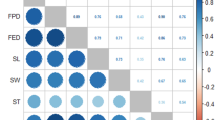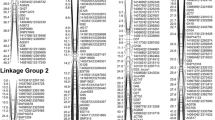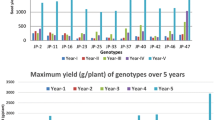Abstract
Jatropha curcas L. (jatropha) is an undomesticated plant with a high potential for sustainable production of biofuels in the tropics and subtropics. Oil content, seed mass, kernel mass, and the ratio of kernel to seed mass are important traits for breeding. These traits could potentially be improved by exploitation of parental effects. Besides, parental effects could be used to separate self- from cross-fertilized seeds and increase the efficiency of hybrid seed production. The main goal of this study was to assess the variation of quantitative seed traits (oil content, seed mass, kernel mass, and ratio of kernel to seed mass) in a panel of self- and cross-fertilized seeds from a genetically diverse germplasm. We analyzed a set of 31 genotypes (12 self- and 19 cross-fertilized genotypes) originated by combination of parental components from 2 different genetic pools (pool A: phorbol ester absence; pool B: phorbol ester present). We found strong significant effects of parental components and genetic pools on most seeds traits. Although the variation in oil content among single seeds was very large, some specific combinations of parental components showed promise to be exploited for rapid and automatized identification and classification of self- and cross-fertilized seeds. We conclude that parental effects need to be considered for breeding and cultivar production.
Similar content being viewed by others
References
Ceasar SA, Ignacimuthu S (2011) Applications of biotechnology and biochemical engineering for the improvement of Jatropha and Biodiesel: a review. Renew Sustain En Rev 15:5176–5185
Divakara BN, Upadhyaya HD, Wani SP, Laxmipathi Gwoda CL (2010) Biology and genetic improvement of Jatropha curcas L.: a review. Appl En 87:732–742
Francis G, Edinger R, Becker K (2005) A concept for simultaneous wasteland reclamation, fuel production, and socio-economic development in degraded areas in India: need, potential and perspectives of Jatropha plantations. Nat Res Forum 29:12–24
Fairless D (2007) Biofuel: the little shrub that could—maybe. Nature 449:652–655
Sanderson K (2009) Wonder weed plans fail to flourish. Nature 461:328–329
King AJ, He W, Cuevas JA, Freundenberger M, Ramiaramanana D, Graham IA (2009) Potential of Jatropha curcas as a source of renewable oil and animal feed. J Exp Bot 60(10):2897–2905
Samocha Y, Eisikowitch D (2014) Vaknin Y. Pollen source effects on fruit and seed traits of Jatropha curcas L.—a renewable biodiesel feedstock, Bioenerg Res. doi:10.1007/s12155-014-9465-1
Montes JM, Technow F, Martin M, Becker K (2014) Genetic diversity of Jatropha curcas L. assessed with SSR and SNP markers. Diversity
Bressan EA, Sebbenn AM, Ferreira RR, Lee TSG, Figueira A (2013) Jatropha curcas L. (Euphorbiaceae) exhibits a mixed mating system, high correlated mating and apomixis. Trees Gene Genomes 9(4):1089–1097
Melchinger AE, Schipprack W, Wuerschum T, Chen S, Technow F (2013) Rapid and accurate identification of in vivo-induced haploid seeds based on oil content in maize. Nat Sci Rep 3(2129):1–4
Martin M, Montes JM (2014) Quantitative genetic parameters of agronomic and quality traits in a global germplasm collection reveal excellent breeding perspectives for Jatropha curcas L. Global Change Biology Bioenergy (in press).
Acknowledgments
The authors thank the technical staff involved in lab and nursery activities.
Author information
Authors and Affiliations
Corresponding author
Rights and permissions
About this article
Cite this article
Montes, J.M., Bulach, A., Martin, M. et al. Quantitative Trait Variation in Self- and Cross-Fertilized Seeds of Jatropha curcas L.: Parental Effects of Genotypes and Genetic Pools. Bioenerg. Res. 8, 1197–1202 (2015). https://doi.org/10.1007/s12155-014-9576-8
Published:
Issue Date:
DOI: https://doi.org/10.1007/s12155-014-9576-8




